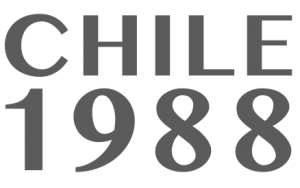Cecilia Herrera
Transcription
That day, October 5, I got up relatively early, but not so much. Because if I arrived very early, they would leave me as a member of the voting table. And there were many, many people. I had never seen so many people participating. I voted quietly, after a long queue, I remember, and I went back home to turn on the TV to wait for the results. And I was living with my mom at that time, and both of us were glued to the TV. I remember that the first vote count they announced was from a remote town, I don’t know where exactly, in the Eighth, in the Araucanía region – Ninth region, where eight people voted. Out of the eight people, six voted for “NO,” and I said, “we’ve already won.” And I would hug my mom, you know, but we were both glued to the TV all day. And I remember that they never announced the results. It was 9 PM, and in this country, the election results are usually announced after about 4 hours. It was 9 PM, and nothing was happening. They were showing vote counts on TV that didn’t match mine because I would attend every election, and I took a notebook and started writing them down. So, I’m someone who recounts the votes. And they didn’t match mine. And I said, “Oh, they’re going to lie to us.” I don’t remember exactly, but it was very late at night when one of the generals—I can’t recall which one, maybe the aviator—said, “Let’s tell it like it is, and the vote counts are as follows.” And the “NO” won. And I can tell you that I didn’t sleep that night. All I wanted was to get to the office the next day, and the next day was like a carnival in the city center. I worked in downtown. Of course, we hugged each other in the office. Those of us who had voted “NO” kept quiet because we knew more or less who was who, you know? But around lunchtime, we went to Paseo Ahumada, and I swear, it felt like being in Rio de Janeiro. It was a carnival. Everyone was hugging everyone. Everyone with everyone. Colorful papers were thrown from the buildings. It was a total celebration. It was beautiful to know that I wasn’t the only one thinking that these gentlemen had to go. And that’s what really happened.
And the other good thing was that I had planned to start a family, but I said to myself, “I’m not going to have a family while we’re under dictatorship.” I wanted my child to be born in freedom, not under dictatorship because I had a really tough time. I was studying at the Pedagogical Institute at the University of Chile to become an English teacher, and I entered there in 1970, during the peak of the Popular Unity government, where almost everyone in that place, well, everyone there, was left-wing. We were with Allende, and everyone was happy. But on that September 11th, 1973, I was at the Pedagogical Institute. The military entered, and months later, they took control of the Pedagogical Institute, and we had to enter and sign a form with our ID cards, and we would get our ID cards back when we left. We couldn’t walk in groups of more than two because three was considered a conspiracy. Out of my classmates, when I used to go to class, we were 25 or 26, but when I returned, there were only 6 of us left. So, we never knew what happened to the others. I imagine that some managed to leave the country, and others disappeared until this day. That’s why I didn’t want my child to be born under dictatorship because Chile had always been such a democratic and beautiful country. It seemed unplanned because I remember it was already March of the following year when Aylwin assumed office, and I was three months pregnant by then. So, everything is deeply associated with that, you see. I always tell my child, “No, you were not going to be born under dictatorship, that’s why I had you so late!” So, no, it was really beautiful. It was really lovely.


